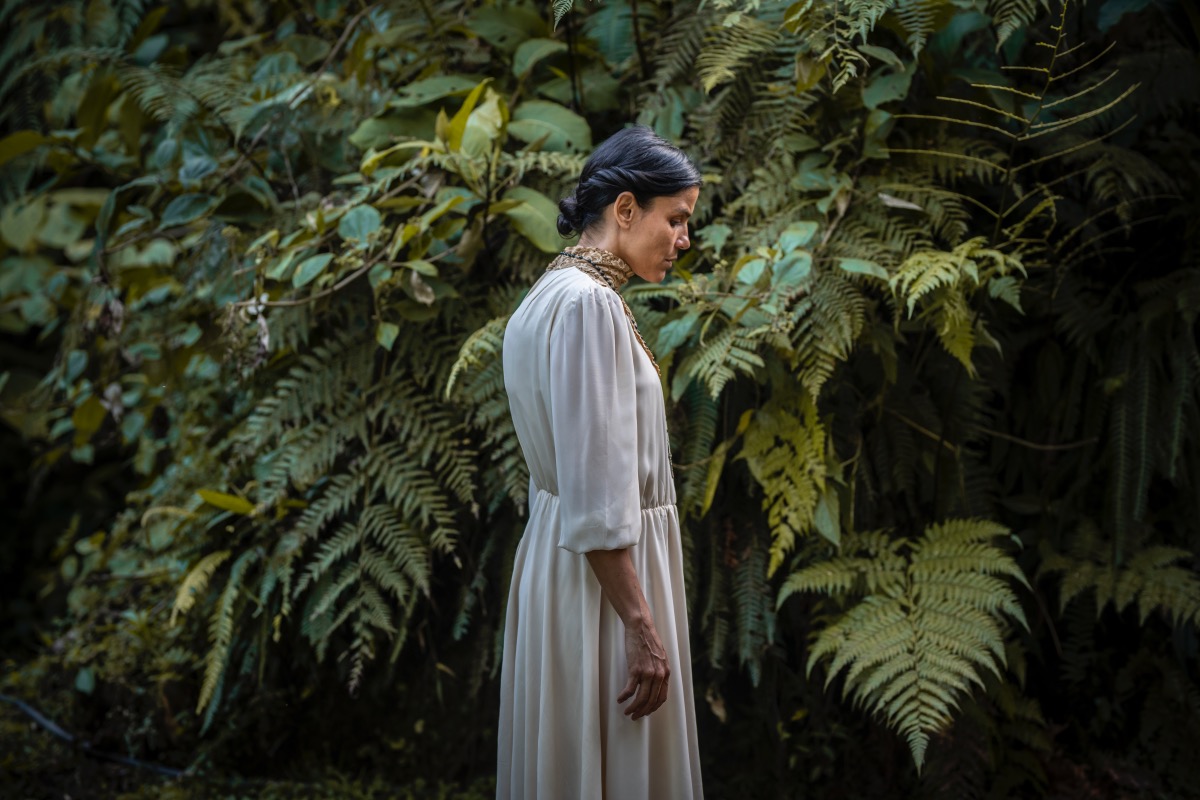

Wendy Chinchilla Araya as “Clara” in ‘Clara Sola’ (Oscilloscope Laboratories)
In some ways, it makes sense that the indie film Clara Sola by Swedish-Costa Rican writer-director Nathalie Álvarez Mesén would stem from a film school admissions prompt to write a treatment inspired by a picture or painting. As Álvarez Mesén told Latino Rebels, the first part of the film she created was based on “a scene of masturbation, where there are a lot of fireflies, and it’s a kind of scene of liberation.”
That moment turned into one of the most visually compelling moments of Clara Sola, a beautiful, haunting, and ultimately healing film that showed at the Cannes Film Festival and is now in theaters in New York and Los Angeles. It follows Clara (Wendy Chinchilla Araya), a woman of mystical power who undergoes a spiritual and sexual awakening as she frees herself from the restrictions of her strict, Catholic grandmother.
It makes sense for Clara Sola to be born from that moment because it contains so many of the film’s themes: the beauty of nature and feminine sexuality, the magic borderlessness that comes with being alone in the wild, the power of rejecting shame and embracing a feminist, sex-positive spirituality.
But in other ways, it’s hard to believe Clara Sola could come from a school assignment because it is such a sophisticated piece of art, revealing Latin American society’s contradictions without snark or condescension. Álvarez Mesén sees this nuance as having stemmed from her personal experience.
“I grew up in a religious family,” she explained. “And even though there are many aspects of it that I like —like the community and the kindness and love and a lot of other things— there are also a lot of aspects that I found limiting and unhealthy… maybe if you didn’t grow up within that, [it] would be more difficult to know what the loving part is… We wanted to always approach [our subject] with a lot of respect, even though we [also] want to burn down certain images and traditions.”


Writer-director Nathalie Álvarez Mesén
In the Anglo press, critics compared Clara Sola to the 1976 horror classic Carrie, despite Álvarez Mesén saying she hadn’t seen Carrie before writing her film. Both are about women with superhuman powers tied to their sexuality who face repression primarily at the hands of their religious matriarchs who abuse them in an effort to keep them chaste and contained. And while that sounds like a lot in common, the films are actually quite different.
For one, their appearance and the overall emotional impression that goes with it are totally distinct. Clara Sola is told in a lush palette of deep greens and arresting pops of light —those fireflies, Clara in white, Clara in blue— while Carrie is mostly muted except for that fantastic and horrific red of the blood at the end. These stylistic choices make Carrie a horror film and Clara Sola a magical treatise on what can happen when women own and embody their power.
In Carrie, there aren’t a lot of options for our young protagonist. Yes, the film is clear that her mother is wrong to punish her for getting her period. But her freer peers are no better, bullying Carrie over the edge. She has no access to the beautiful parts of womanhood, no path to understand herself, her power, or her sexuality in a way that will lead to fulfillment.
Clara Sola, in contrast, is a film of positive personal transformation in which our protagonist learns to push for her full humanity thanks in part to the healing ability of nature. Early in the film, Clara accepts her grandmother’s punishment for masturbating—having her fingers soaked in chili oil. But as her journey continues, Clara learns to reject that kind of treatment and go her own way.
“Clara is a lot about healing, and about having the right to decide over your own life and your own body,” Álvarez Mesén said. “And I feel sexuality plays a role, part of being a whole person.”
Other than sex-positive, Clara Sola defies easy labels and comparisons. It’s a quiet film that is both violent and curative. Strong in its perspective, it holds space and grace for those with differing views even as it exposes the error of their ways.
In the end, the film communicates an insider’s understanding of the connections between Latina spirituality and sexuality. And that’s not something we usually see on-screen.
***
A writer and activist, Cristina Escobar is the co-founder of latinamedia.co, uplifting Latina and gender non-conforming Latinx perspectives in media. She’s a member of the Latino Entertainment Journalists Association and writes at the intersection of race, gender, and pop culture. Twitter: @cescobarandrade


